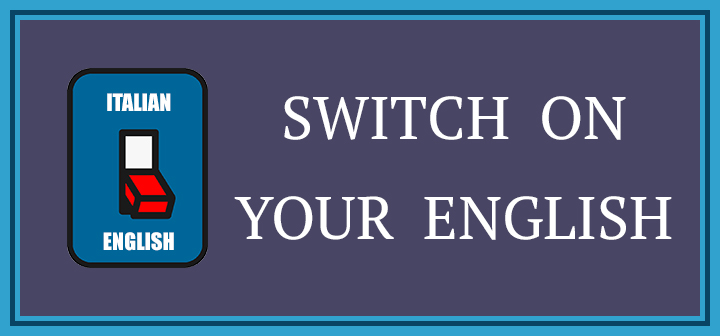La traduzione, come metodo di esercizio nell’apprendimento di una lingua, farà sicuramente parte della vecchia scuola, però, inserita in un contesto più vario di apprendimento, soprattutto con feedback in tempo reale, può sempre essere un utile esercizio di allenamento.
Consiglio una partecipazione attiva e visibile postando la tua versione tra i commenti in fondo a questa pagina. In questo modo riceverai un mio commento o suggerimento in tempo più o meno reale. Ma per chi non se la sente, si può semplicemente annotare la propria versione e controllarla attraverso i miei commenti lasciati per gli altri.
Ecco la nuova frase:
Che tempi strani quelli in cui viviamo. Mi chiedo come sarà il futuro quando i nostri figli saranno cresciuti.
Buon divertimento!
Puoi esercitarti quanto vuoiQUI.
Your comments are always very welcome.





I nearly forgot to do my translation duty, Tony! Just in time for the next one!
Anyway here’s the last Friday’s translation.
Che tempi strani quelli in cui viviamo. Mi chiedo come sarà il futuro quando i nostri figli saranno cresciuti.
What strange times we’re living in. I wonder what the future will be like when our children are grown up!
LikeLiked by 1 person
Nice one, Claudio. 🙂
LikeLike
gChe tempi strani quelli in cui viviamo. Mi chiedo come sarà il futuro quando i nostri figli saranno cresciuti.Buon diverti
good afternoon,
how strange the days we are living (in) are.i wonder what the future Will be like when our Kids Will have grown up.
LikeLike
Well, Roby, if you use your “how strange” version, then you do need the “in” after “living”. However, I think the “what strange times” version would be more typical here.
The last verb should be a “present perfect”, Roby as it’s a “proposizione temporale al futuro” and the “futuro anteriore” should be translated with a present perfect. Otherwise you’ve got too many futures!
LikeLike
ohhh i see prof ,thanks a lot.
We have *when*temporale and we can t use the future tense.i forgot.
p.s thanks for posting these versions prof.they Always turn out tò be extremely useful.
LikeLike
What strange times the ones in which we are living in. I wonder how the future will be when our children will have grown up
LikeLike
Hi Angelo. Your version is quite comprehensible but there are a few things to note:
Look here.
LikeLike
Che tempi strani quelli in cui viviamo. Mi chiedo come sarà il futuro quando i nostri figli saranno cresciuti.
What strange times we live in. I wonder what the future will be like when our children grow up.
LikeLike
Good, Dino, but personally, I would put the first verb in the present continuous to underline the idea of “in this period” and the last verb in the present perfect, the equivalent in English of the “futuro anteriore” in Italian.
However, your version is perfectly acceptable. 🙂
LikeLike
Hi prof
What strange times we live in. I wonder what future will be when our children are growing up.
Thank you very much
LikeLike
Fully comprehensible, but there are a few things to sort out:
LikeLike
Che tempi strani quelli in cui viviamo.
Mi chiedo come sarà il futuro quando i nostri figli saranno cresciuti.
What strange times those we are living in.
I wonder what the feature will be like when our children are grown up.
LikeLike
You let yourself be fooled by that “quelli”, Paolo. It’s totally unnecessary in English.
feature ➝ future (typo?)
“are grown up” is all right, but it is “static”
“have grown up” is “dynamic”, and perhaps better here.
LikeLike
Got it, I’ll try again.
Che tempi strani quelli in cui viviamo.
Mi chiedo come sarà il futuro quando i nostri figli saranno cresciuti.
What strange times (those) we are living in.
I wonder what the future will be like when our children have grown up.
LikeLiked by 1 person
That’s it, Paolo! But you can totally eliminate “those”! 🙂
LikeLiked by 1 person
What strange times we are living in. I wonder what the future will be when our children are grown up.
LikeLike
Good, Nadia, but what happened to “like”?
Remember the construction is: WHAT … (to be) … LIKE”.
LikeLike
What strange times we are living in. I wonder what the future will be like when our children are grown up.
LikeLiked by 1 person
😀👍
LikeLike
what strange times we live in. I wonder what the future will be like when our children grow up
LikeLike
Very good, Giovanna.
My only comment would be that perhaps a present continuous at the beginning would give more the idea of “in this period”. However, the present simple is equally possible.
LikeLiked by 1 person
what strange times we are living in. I wonder what the future will be like when our children grow up
thanks Tony ✨
LikeLiked by 1 person
😀👍
LikeLike
Good morning, Teacher
Che tempi strani quelli in cui viviamo. Mi chiedo come sarà il futuro quando i nostri figli saranno cresciuti.
What weird times we’re living in.
I wonder how the future will be when our children will be grown up
🙄
LikeLike
Pretty good, Anita.
The only problem in your version is that future tense at the end. It should be either a present tense or, perhaps better still, a present perfect (proposizioni temporali al futuro).
Although “how the future will be” is all right, I think it might be more typical for a native speaker to say, “what the future will be like”.
LikeLike
what strange times those we’re livin’ in.I wonder what the future will be like when our sons have grown up
LikeLike
Good Davide.
Just two small points here. There’s no need for “those” in the first part, and I would use “children” in the second part because “sons” is specifically masculine in English. An alternative would be to say “sons and daughters”.
LikeLiked by 1 person
Hi Tony, good morning!
What strange times we live in. I wonder what the future will hold (will be) when our sons have grown up
LikeLike
Nice, Gaetano. Just a couple of small points.
The “hold” version is generally either used on its own or with a follow-up such as “will hold for him etc”. It doesn’t work very well followed by a second clause. “Will be” is more suitable here, but it needs “like” to complete the meaning.
Personally, I would use the present continuous for the first verb to give that sense of “in this period”, but the present simple is also possible.
LikeLike
Oh, and I would use “children”, not “sons”. Remember that “sons” is specifically masculine.
LikeLike
Ok Tony:
What strange times we are living in. I wonder the future will be when our children have grown up
LikeLike
I wonder what future will be like when our children have grown up.
LikeLiked by 1 person
OK. The only thing that’s missing now is the article before “future”, but it’s obviously a “typo” as you used it previously! 🙂
LikeLike
Che tempi strani quelli in cui viviamo. Mi chiedo come sarà il futuro quando i nostri figli saranno cresciuti.
What strange times the ones we are living in/ getting through! I wonder how the future will be like when our children are grown up.
LikeLike
Nice try, Dani, but:
LikeLike
What strange times we are living in! I wonder what the future will be when our children are grown up.
Thanks
LikeLike
Dani, you’ve changed “how” to “what”, but you’ve also eliminated “like” which is a necessary part of the “what…(to be)…like” construction!
LikeLike
Yes, I did. I seeeeee… It’s like “what’s the weather like?” As usual, I make a mess.
What strange times we are living in! I wonder what the future will be like when our children are grown up.
Thanks again
LikeLiked by 1 person
😀👍
LikeLike